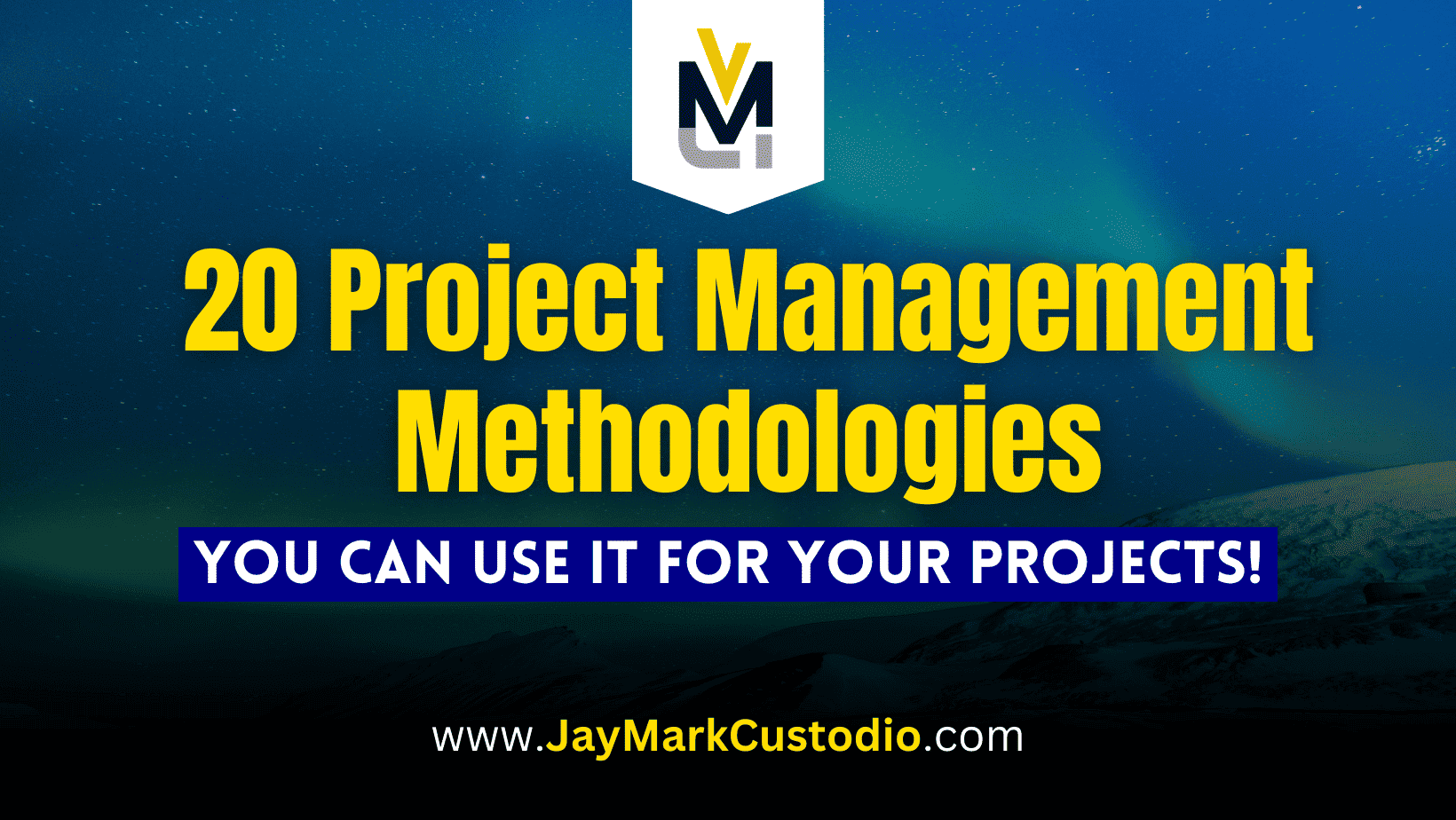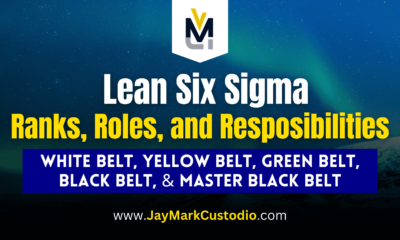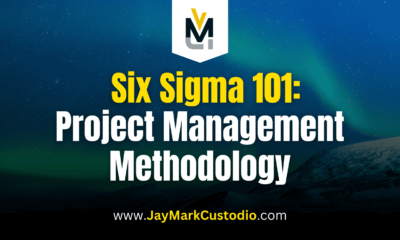Business
20 Project Management Methodologies You Can Use for Your Projects!

Project management methodologies are structured approaches to managing projects that provide guidelines, techniques, and tools for planning, executing, and controlling projects.
They help project managers and teams manage projects more effectively and efficiently by providing a clear framework for managing project risks, quality, scope, schedule, and resources.
Different project management methodologies have different strengths and weaknesses and are suitable for various projects and organizations. The choice of methods depends on the project goals, requirements, constraints, and organizational culture.
Here is the List of Project Management Methodologies…
Table of Contents
1. Waterfall
Waterfall is a linear and sequential approach to project management often used in construction, manufacturing, and software development. It involves breaking the project into sequential phases, where each step must be completed before the next one begins. While Waterfall is a very structured approach to project management, it can be inflexible. It may not be suitable for projects with changing requirements.
2. Agile
Agile is an iterative approach to project management often used in software development, where the requirements and solutions evolve through the collaborative effort of self-organising and cross-functional teams. Agile emphasises flexibility, adaptability, and collaboration and involves breaking the project down into small, manageable chunks that can be completed in short iterations called sprints.
3. Scrum
Scrum is an Agile framework emphasising collaboration, iterative development, and continuous improvement to deliver high-quality products. Scrum involves breaking the project into sprints, where the team works together to complete tasks. Scrum emphasises the importance of communication, teamwork, and transparency and provides a set of roles, ceremonies, and artifacts to help teams work effectively together.
4. Lean
Lean is a project management methodology that aims to minimise waste and maximise value by focusing on the customer and optimising the workflow. Lean emphasises the importance of continuous improvement and involves identifying and eliminating waste in the project process. Lean is often used in manufacturing, where it has successfully reduced costs, improved quality, and increased efficiency.
5. Kanban
Kanban is a visual project management system that uses a board to visualise the workflow, limit work in progress, and optimise the throughput. Kanban involves breaking the project into tasks added to the Kanban board. The board is divided into columns representing the different stages of the project process, and each assignment is moved through the board as it progresses. Kanban emphasises the importance of limiting work in progress and using visual cues to manage the workflow.
6. Six Sigma
Six Sigma is a data-driven approach to process improvement that aims to minimise defects and variability in a process. Six Sigma involves breaking the project into phases, where each step consists of activities designed to identify and eliminate weaknesses. Six Sigma emphasises the importance of data analysis and statistical tools to measure and improve process performance.
7. PRINCE2
PRINCE2 is a project management methodology that provides a structured approach to project management, focusing on the business case, organisation, quality, plans, risk, change, and progress. PRINCE2 involves breaking the project down into stages. It provides a set of processes, activities, and templates to help manage the project. PRINCE2 emphasises the importance of project governance and provides a clear framework for managing project risks and issues.
8. PMI/PMBOK
The Project Management Institute (PMI) provides a project management methodology called the Project Management Body of Knowledge (PMBOK). PMBOK provides a framework for managing projects, focusing on the 10 knowledge areas and five process groups. PMBOK emphasises the importance of project planning, monitoring, and control and provides tools and techniques to help manage the project.
9. Critical Path Method (CPM)
The Critical Path Method (CPM) is a project management methodology that uses a network diagram to identify the critical path and optimise the schedule. CPM involves breaking the project down into tasks, which are then sequenced on a network diagram. CPM emphasises the importance of scheduling and provides tools and techniques to help manage the project schedule.
10. Event Chain Methodology (ECM)
The Event Chain Methodology (ECM) is a project management methodology that focuses on managing project risks by identifying and organising events that could impact the project. ECM involves breaking the project into events, which are then analysed to determine risks and opportunities. ECM emphasises risk management’s importance and provides tools and techniques to help manage project risks.
11. Rapid Application Development (RAD)
Rapid Application Development (RAD) is an Agile project management methodology emphasising rapid prototyping and iterative development. RAD involves breaking the project into small, manageable chunks that can be completed in short iterations. RAD emphasises the importance of collaboration and communication and provides tools and techniques to help manage the project.
12. Extreme Programming (XP)
Extreme Programming (XP) is an Agile project management methodology emphasising customer satisfaction, continuous delivery, and teamwork. XP involves breaking the project into small, manageable chunks that can be completed in short iterations. XP emphasises the importance of testing, continuous integration, and teamwork and provides tools and techniques to help manage the project.
13. Adaptive Project Framework (APF)
Adaptive Project Framework (APF) is a project management methodology that focuses on adapting to changing requirements and project conditions. APF involves breaking the project into small, manageable chunks that can be completed in short iterations. APF emphasises the importance of flexibility and adaptability and provides tools and techniques to help manage the project.
14. Crystal
Crystal is a project management methodology emphasising teamwork, communication, and simplicity. Crystal involves breaking the project into small, manageable chunks that can be completed in short iterations. Crystal emphasises the importance of communication, teamwork, and simplicity and provides tools and techniques to help manage the project.
15. Feature Driven Development (FDD)
Feature Driven Development (FDD) is an Agile project management methodology emphasising iterative development, feature-based planning, and continuous integration. FDD involves breaking the project into features, which are then developed in short iterations. FDD emphasises the importance of collaboration, communication, and continuous integration and provides tools and techniques to help manage the project.
16. Dynamic Systems Development Method (DSDM)
Dynamic Systems Development Method (DSDM) is an Agile project management methodology emphasising collaboration, communication, and continuous testing. DSDM involves breaking the project into short iterations developed in partnership with stakeholders. DSDM emphasises the importance of testing, collaboration, and communication, providing tools and techniques to help manage the project.
17. Rational Unified Process (RUP)
Rational Unified Process (RUP) is a project management methodology that provides a framework for software development, focusing on the iterative and incremental delivery of high-quality software. RUP involves breaking the project into phases, each involving a set of activities designed to deliver a working software product. RUP emphasises the importance of collaboration, communication, and quality and provides tools and techniques to help manage the project.
18. Integrated Project Management (IPM)
Integrated Project Management (IPM) is a methodology that integrates project management with other business functions, such as finance, marketing, and operations. IPM involves breaking the project into phases, each consisting of a set of activities designed to integrate project management with other business functions. IPM emphasises the importance of communication, collaboration, and integration and provides tools and techniques to help manage the project.
19. Total Quality Management (TQM)
Total Quality Management (TQM) is a project management methodology that emphasises the importance of quality and continuous improvement in all aspects of the project. TQM involves breaking the project into phases, where each step involves activities designed to improve project quality. TQM emphasises the importance of customer satisfaction, continuous improvement, and teamwork and provides tools and techniques to help manage the project.
20. Design Thinking
Design Thinking is a project management methodology that focuses on understanding the customer’s needs and using creative thinking to develop innovative solutions to meet those needs. Design Thinking involves breaking the project into phases, where each step involves activities designed to identify and validate customer needs. Design Thinking emphasises the importance of creativity, collaboration, and innovation. It provides a set of tools and techniques to help manage the project.







